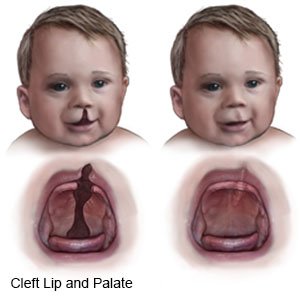Cleft Lip and Cleft Palate
Medically reviewed by Drugs.com. Last updated on Jun 5, 2024.
A cleft lip is a condition that causes an opening or split in your child's upper lip. A cleft palate is in the roof of your child's mouth. Your child may have a cleft lip, a cleft palate, or both. Cleft lip and cleft palate are types of birth defects. They happen when your child's lip or the roof of the mouth do not grow normally during pregnancy. A cleft happens early in pregnancy as your child's facial bones form. Your child may be more likely to have a cleft if a family member had one. Medicines, viral infections, smoking, or drinking alcohol during pregnancy may also increase your child's risk.
WHILE YOU ARE HERE:
Informed consent
is a legal document that explains the tests, treatments, or procedures that your child may need. Informed consent means you understand what will be done and can make decisions about what you want. You give your permission when you sign the consent form. You can have someone sign this form for you if you are not able to sign it. You have the right to understand your child's medical care in words you know. Before you sign the consent form, understand the risks and benefits of what will be done to your child. Make sure all of your questions are answered.
Stay with your child for comfort and support
as often as possible while he or she is in the hospital. Ask another family member or someone close to the family to stay with your child when you cannot be there. Bring items from home that will comfort your child, such as a favorite blanket or toy.
An IV
is a small tube placed in your child's vein that is used to give medicine or liquids.
Antibiotics
may be given to help treat or prevent an infection caused by bacteria.
Tests:
- X-ray pictures may show how your child's lungs and heart are working. The pictures may also show any other birth defects.
- Videofluroscopy is a test used to check your child's ability to speak and swallow. Your child will be given a liquid to drink. Then several x-rays are taken while your child speaks or swallows.
Treatment:
- Extra oxygen may be given if your child is having trouble breathing. Your child may also need surgery or a procedure to fix problems in his or her mouth to help make breathing easier.
- Nutrition support may be given if your child has trouble feeding.
- Cleft lip or cleft palate repair is surgery to close the openings in your child's lip or mouth. Your child may need immediate treatment for breathing or feeding problems. Surgery may be scheduled later. Surgery for a cleft lip may be done when your child is 3 to 6 months old. A cleft palate may be repaired at 9 to 12 months.

RISKS:
Your child may need more surgeries as he or she grows. He or she may need special dental care to help his or her teeth grow normally. Without treatment, your child may have problems sucking. This can delay how much weight he or she gains as he or she grows. He or she may be tired after eating from working harder to suck and swallow. Feeding problems may cause liquids to back up into your child's ear canals. This increases the chance of ear infections and long-term hearing problems. The cleft may also cause your child to have problems with speech.
CARE AGREEMENT:
You have the right to help plan your child's care. Learn about your child's health condition and how it may be treated. Discuss treatment options with your child's healthcare providers to decide what care you want for your child.© Copyright Merative 2024 Information is for End User's use only and may not be sold, redistributed or otherwise used for commercial purposes.
The above information is an educational aid only. It is not intended as medical advice for individual conditions or treatments. Talk to your doctor, nurse or pharmacist before following any medical regimen to see if it is safe and effective for you.
Further information
Always consult your healthcare provider to ensure the information displayed on this page applies to your personal circumstances.
